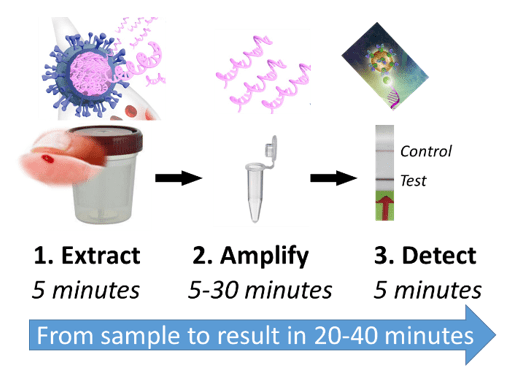
This three-step protocol reduces sample testing complexity to eliminate current nucleic acid extraction bottlenecks.

Extract
Beginning with raw samples (eg, blood, tissue or swabs from the patient), a simple and proprietary five minute extraction protocol releases the sample’s nucleic acid material into the BioCifer reagent solution. This triggers a chemical reaction that rapidly amplifies DNA to detectable levels. No complex laboratory equipment is required for sample processing, allowing tests to easily be performed in virtually any setting, with results returned in less than 10 minutes.
Amplify
High sensitivity is achieved via an off-the-shelf isothermal amplification procedure, adapted by BioCifer for specific pathogens. Isothermal amplification and reaction methods provide a rapid, specific, simple and less expensive procedure for detecting nucleic acid from samples.
As this step of the process is highly selective, only the uninfectious gene portion is amplified so clinicians and support staff are not exposed to the pathogen itself – only the specific biomarkers isolated during extraction.
The time for amplification varies from five to thirty minutes (based on the specific pathogenic biomarkers being processed), with a median time of ten minutes. Another major benefit of isothermal amplification is that it requires much lower temperatures (to 37-39°C) during amplification, enabling it to be successfully used for diagnostics in point of care testing. BioCifer’s platform provides a heat-controlled battery-powered heating block for this purpose.
Detect
Results are confirmed using BioCifer developed lateral flow strips (similar to an at-home pregnancy test), within five minutes of applying the amplified sample. Because these strips are designed to detect amplified nucleic acids rather than antigen/ antigen-antibody detection, the BioCifer platform achieves similar sensitivities to laboratory-based molecular genetics tests (typically, 10-100 copies/μL).